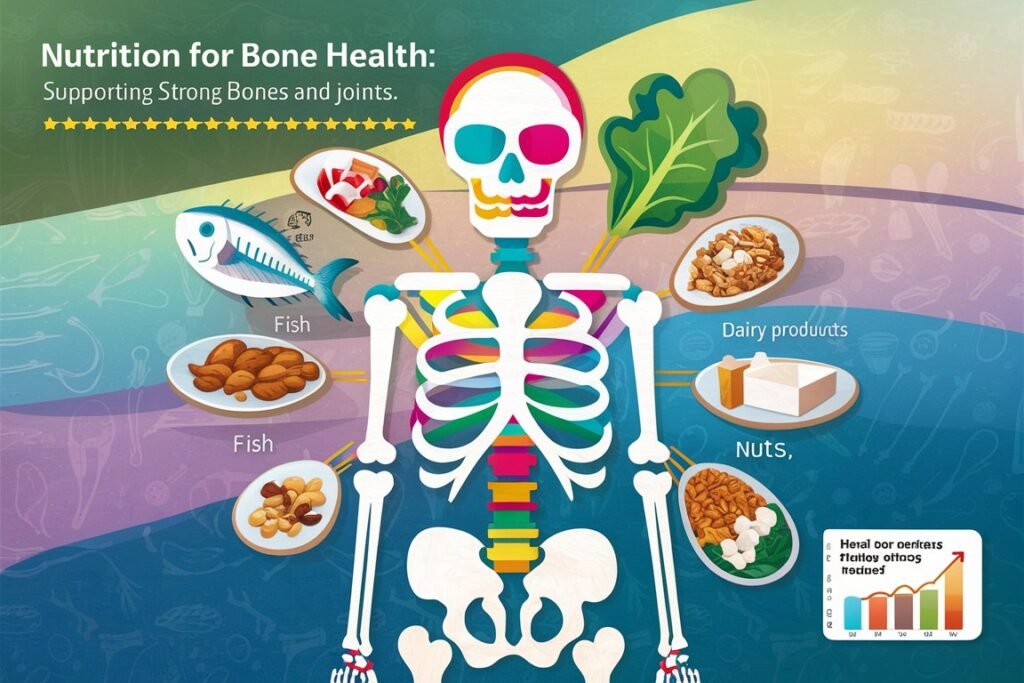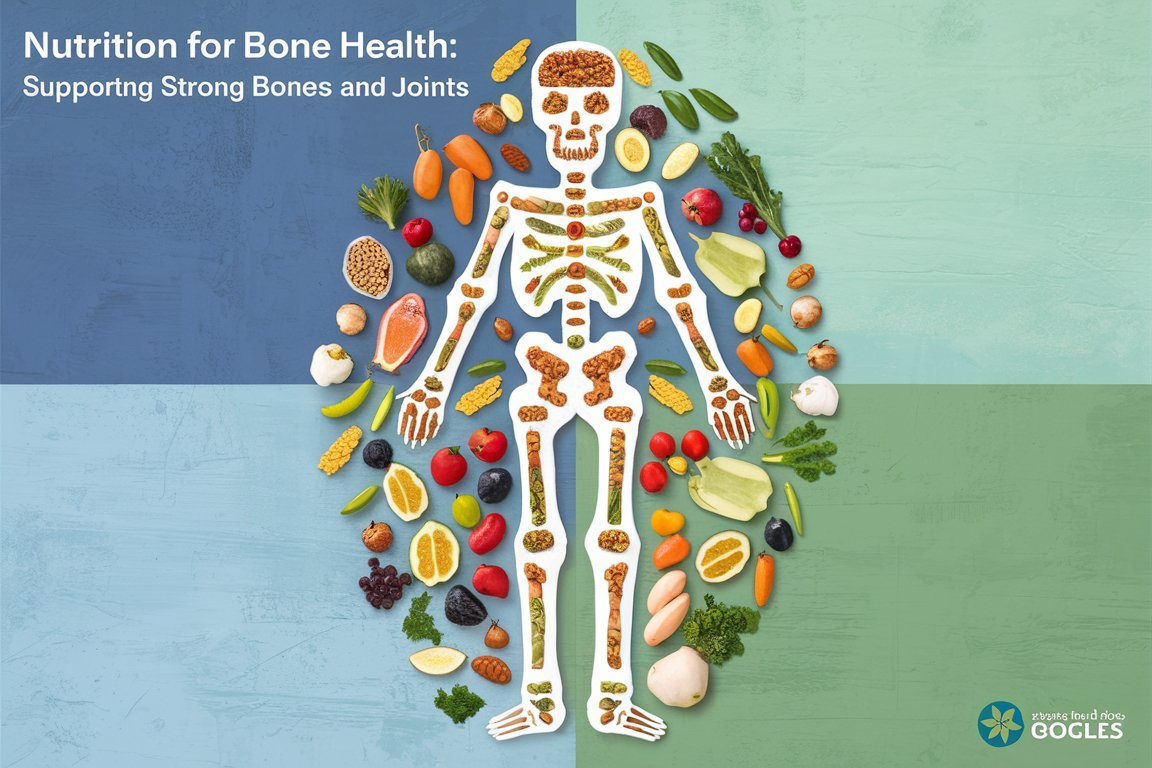Nutrition for Bone Health: Supporting Strong Bones and Joints
Hey there, my young and adventurous friends of 2024! It’s your favorite nutrition explorer, Nita Sharda, here to take you on an exciting journey into the world of bone health. Now, I know what you might be thinking – “Bone health? That sounds like something only old people need to worry about!” But trust me, taking care of our bones is important for everyone, no matter what age we are.
Today, we’re going to put on our explorer hats and discover how the foods we eat can help us build and maintain strong, healthy bones and joints. But before we dive in, let me make one thing clear – this is not about putting anyone on a strict diet or making them feel bad about what they eat. It’s simply about empowering you with the knowledge and tools to make food choices that support your bone health, now and in the future.
So, are you ready to embark on this bone-building adventure with me? Let’s go!
Why is Bone Health Important?
First things first, let’s talk about why bone health is so important. Our bones are like the scaffolding that holds our bodies up and allows us to move, jump, and play. They also protect our vital organs, like our heart and lungs, and store important minerals like calcium and phosphorus.
When we’re young, our bones are constantly growing and changing. In fact, we reach our peak bone mass (the maximum amount of bone we’ll ever have) around age 30. After that, our bones start to slowly lose mass and become more fragile.
If we don’t take care of our bones when we’re young, we may be at higher risk for bone problems later in life, like osteoporosis (a condition where bones become weak and brittle) or fractures (broken bones).
But the good news is that there’s a lot we can do to support our bone health, and it all starts with the foods we eat!
The Building Blocks of Bone Health
So, what are the key nutrients that our bones need to stay strong and healthy? Here are a few of the most important ones:

1. Calcium
Calcium is the most well-known nutrient for bone health, and for good reason – it’s the main mineral that makes up our bones! In fact, about 99% of the calcium in our bodies is stored in our bones and teeth.
We need to get enough calcium from our diets to help our bones grow and stay strong. Some of the best food sources of calcium include:
- Dairy products, like milk, yogurt, and cheese
- Leafy green vegetables, like spinach and kale
- Calcium-fortified foods, like orange juice and tofu
- Canned fish with bones, like sardines and salmon
2. Vitamin D
Vitamin D is another important nutrient for bone health, because it helps our bodies absorb and use calcium. Without enough vitamin D, our bodies can’t use the calcium we eat to build and maintain strong bones.
We can get vitamin D in a few different ways:
- From sunlight exposure (our bodies can make vitamin D when our skin is exposed to the sun)
- From certain foods, like fatty fish, egg yolks, and fortified dairy products
- From supplements (if we’re not getting enough from sunlight or food)
3. Phosphorus
Phosphorus is another mineral that’s important for bone health. It works together with calcium to build and maintain strong bones and teeth.
We can get phosphorus from a variety of foods, including:
- Meat, poultry, and fish
- Dairy products
- Beans and lentils
- Nuts and seeds
4. Magnesium
Magnesium is a mineral that plays a key role in bone health by helping regulate calcium levels in the body. It also helps activate vitamin D, which is important for calcium absorption.
Some good food sources of magnesium include:
- Leafy green vegetables
- Nuts and seeds
- Whole grains
- Beans and lentils
5. Vitamin K
Vitamin K is a nutrient that helps activate certain proteins involved in bone metabolism. It also helps regulate calcium levels in the body and may help prevent calcium from building up in the arteries.
We can get vitamin K from a variety of foods, including:
- Leafy green vegetables, like spinach and kale
- Broccoli and Brussels sprouts
- Fermented foods, like natto and sauerkraut
Putting It All Together: A Bone-Building Meal Plan
Now that we know some of the key nutrients for bone health, let’s talk about how to put them all together into a delicious and nutritious meal plan. Here’s an example of what a day of eating for strong bones might look like:
Breakfast:
- Yogurt parfait with layers of plain Greek yogurt, berries, and granola
- Scrambled eggs with spinach and cheese
- Glass of calcium-fortified orange juice
Snack:
- Handful of almonds and dried apricots
- Carrot sticks with hummus
Lunch:
- Tuna salad sandwich on whole grain bread with lettuce and tomato
- Side salad with mixed greens, cherry tomatoes, and a sprinkle of feta cheese
- Glass of low-fat milk
Snack:
- Smoothie made with low-fat milk, frozen berries, and a handful of spinach
- Hard-boiled egg
Dinner:
- Grilled salmon with roasted broccoli and sweet potato wedges
- Quinoa salad with chickpeas, red bell pepper, and a lemon-olive oil dressing
- Glass of calcium-fortified soy milk
Snack:
- Plain yogurt with a drizzle of honey and a sprinkle of chia seeds
Remember, this is just an example – the specific foods you choose may vary based on your preferences and what’s available to you. The key is to focus on including a variety of nutrient-dense foods that provide the building blocks for strong bones.
Other Lifestyle Factors That Support Bone Health
While nutrition is a key factor in bone health, there are other lifestyle factors that can also play a role. Here are a few things to keep in mind:
1. Physical Activity
Engaging in regular physical activity, especially weight-bearing activities like running, jumping, and dancing, can help build and maintain strong bones. When we put stress on our bones through exercise, it stimulates them to become stronger and denser.
Aim for at least 60 minutes of physical activity most days of the week, and try to include a variety of activities that you enjoy.
2. Avoiding Smoking and Excessive Alcohol Intake
Smoking and excessive alcohol intake can both have negative effects on bone health. Smoking can decrease bone density and increase the risk of fractures, while excessive alcohol intake can interfere with calcium absorption and bone formation.
If you do choose to drink alcohol, do so in moderation (no more than one drink per day for women and two drinks per day for men). And if you smoke, consider quitting or seeking help to do so.
3. Getting Enough Sleep
Believe it or not, getting enough sleep is also important for bone health! During sleep, our bodies release hormones that help regulate bone metabolism and support bone growth and repair.
Aim for 9-11 hours of sleep per night for kids and 8-10 hours per night for teens. If you have trouble falling or staying asleep, try establishing a consistent bedtime routine and creating a cool, dark, and quiet sleep environment.
4. Maintaining a Healthy Body Weight
Maintaining a healthy body weight is important for overall health, including bone health. Being underweight can increase the risk of osteoporosis and fractures, while being overweight can put extra stress on the bones and joints.
Aim to maintain a healthy body weight by following a balanced diet and engaging in regular physical activity. If you’re concerned about your weight, talk to a healthcare provider or registered dietitian for personalized guidance.
The Bottom Line
Wow, we covered a lot of ground today! But I hope this gives you a better understanding of how the foods we eat can support strong, healthy bones and joints.
Remember, building and maintaining strong bones is a lifelong process – it’s not something that happens overnight. But by making small, consistent changes to your diet and lifestyle, you can set yourself up for a lifetime of healthy bones and joints.
So keep exploring, keep learning, and keep nourishing your bones with all the good stuff they need to stay strong and sturdy. And if you ever have any questions or need some extra support on your bone health journey, don’t hesitate to reach out to a trusted adult or healthcare professional. We’re all in this together, and every step towards better bone health is worth celebrating!
Thanks for joining me on this exciting adventure into the world of bone health. Until next time, keep shining bright and standing tall!












1 Comment